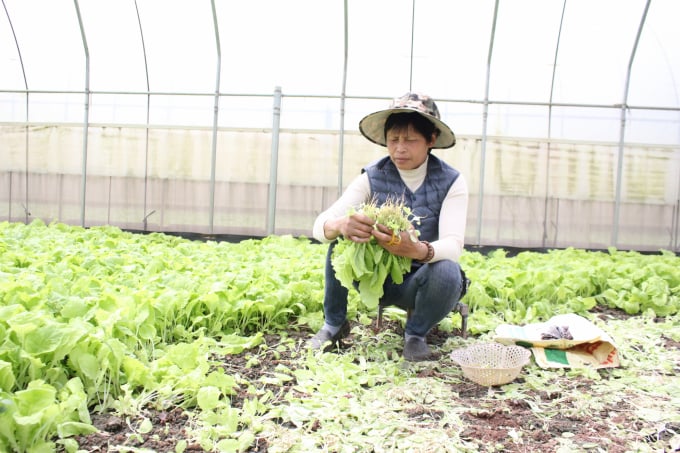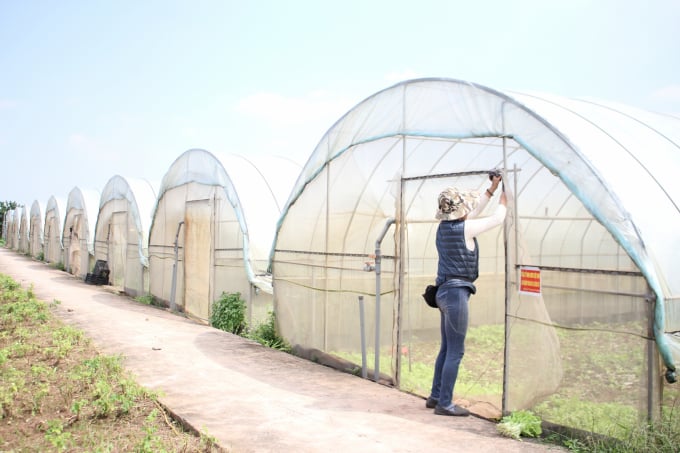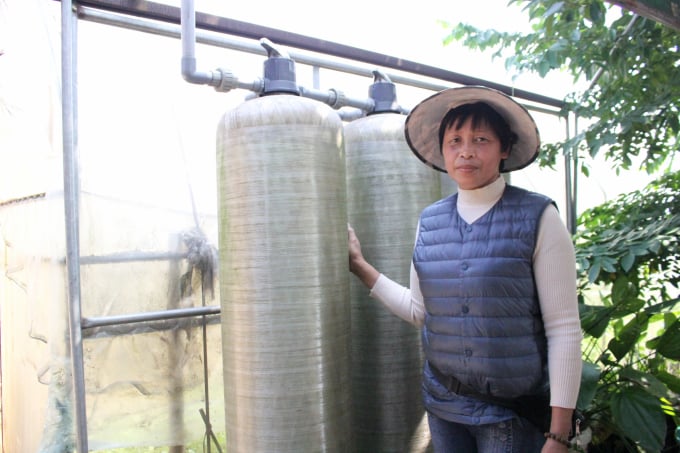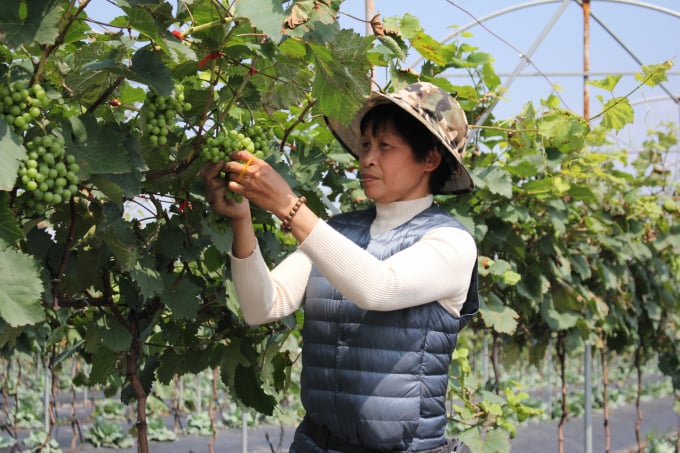June 21, 2025 | 01:31 GMT +7
June 21, 2025 | 01:31 GMT +7
Hotline: 0913.378.918
June 21, 2025 | 01:31 GMT +7
Hotline: 0913.378.918
In Doai Khe village, Dan Phuong Commune (Hanoi) no one doesn’t know Dang Thi Cuoi, Director of Cuoi Quy Organic Vegetable Cooperative and the story about her extraordinary energy and efforts in growing organic vegetables.
After sixteen years working as workers in Taiwan and Japan, Cuoi and her husband decided to get back home to start a business in 2017. They always dreamt of establishing an organic vegetable farm of their own.
Cuoi said she and her husband had the opportunities to work abroad in the companies specializing in safe vegetable production. At first she was overwhelmed with the size and new farming methods here that she and her husband had never seen before.

Dang Thi Cuoi, Director of Cuoi Quy Organic Vegetable Cooperative. Photo: Trung Quan.
As hard-working and eager-to learn persons, Cuoi and her husband quickly caught up with new farming methods and unique farming techniques. They bought and collected every single useful item and guide-books and sent them to the home country for reading later.
“Other overseas workers, they sent money home to their family while all things we sent home every month were plastic tarpaulin, ties and screws,” Cuoi said.
With what they learnt during working abroad, Cuoi and her husband decided to cut down her family’s unproductive guava orchard when they got back home. Then they set up a greenhouse farm on an area of three saos (1 sao = 360 square meters) to grow organic vegetables.
According to Cuoi, growing vegetables in a greenhouse is more convenient because this method protects crop from external threats such dirt, extreme weather events and certain pests.
Technically, Cuoi Quy organic vegetable cooperative has strictly complied with “5-no”principle which means the farm say no to herbicides, chemical fertilizers, pesticides, growth stimulators, GMO seeds.
Regarding soil preparation, after harvesting vegetables Cuoi uses torches to kill weeds, pests and bacteria. After that, she spreads organic fertilizer over the farm at rational doses. One thing special here is that the greenhouse will be closed from the day seeds are sowed until the harvest and only watering activities are regularly conducted for vegetables during that period.

The greenhouse system was established by Cuoi and her husband. Photo: Trung Quan.
To kill insects and pests that attack plants, the cooperative absolutely do not use chemical pesticides. Instead they place insect traps at four corners of the greenhouse. Outside the greenhouse, the cooperative’s members catch bugs and insects with hands.
If the density of insects is high the cooperative will use a probiotics product made by Cuoi. It’s a kind of probiotics created by mixing the insects themselves with bio-yeast, sugar and milk.
‘I learned this method when I worked in Japan. I know that sounds funny but it worked f my farm. Apart from adding nutrients to the soil, the product makes hard for insects to eat plants. Insects will not die immediately but they will die gradually,” Cuoi said.
Regarding seeds, the cooperative has mainly use seed imported from foreign countries such as Japan, Taiwan (China) or seeds supplied by domestic reputable firms.
The water used for plants is carefully purified through three systems of filtration pools. Initially, the water goes through two three-ply filtration pools made of sand, gravel and activated carbon. After that, the water runs to the third pool with composite materials for removing color, odor and heavy metals. Eventually, the water flows into a container to be pumped to the water spray system on the farm.
Regarding fertilizer, the Cooperative uses only organic fertilizers imported from foreign countries. Despite higher prices these products are better for the soil health. Besides, the cooperative also uses plant ash, chicken or duck manure and soybean to make compost for their crops.
Cuoi said when starting business her relatives and friends advised her to stop because there were many organic farming models unsuccessful even when they got funding while Cuoi and her husband paid their own money that they had to work to earn for years. If they failed they would have nothing left. Moreover it was not easy to produce safe vegetable and selling the products was even harder.

The water used for vegetables was carefully purified. Photo: Trung Quan.
“At first, a lot of customers did not believe that our vegetables were organic. They told me that organic vegetables must look ugly they couldn’t be beautiful like that. So, I couldn’t sell my vegetables,” said Cuoi.
As a person not easily discouraged, Cuoi came up with the idea of selling vegetables for free. She gave away the vegetables and invited people to come and see her farm. Gradually , good news travels fast , the safe vegetables of the cooperative has become popular for local consumers.
Not once but many times, Cuoi had to explained and proved to consumers the quality of the cooperative’s vegetables. Once when she were spraying probiotics product over the vegetable beds she drank that probiotics to show that what she used was not chemical pesticide.
“Anyone if they do not believe me I will not angry with them. Instead I will patiently explain to them and invite them to come and see our farm. If they want to learn how to grow vegetable organically I am willing to share my experience and knowledge,” Cuoi said.
After three years, by the efforts of Cuoi and other members in the cooperative, the brand of Cuoi Quy Organic Vegetables has affirmed its position in the market. From the first three saos the cooperative has expanded the cultivation to five hectares including two hectares of greenhouse that grow from leafy greens to grapes and guavas.

Apart from leafy greens, the Cooperative also grows grapes and guavas. Photo: Trung Quan.
The Cooperative’s food products got organic certification of Hanoi Department of Agriculture and Rural Development for meeting the Vietnam’s organic standards in March 2020. In addition the cooperative’s organic farming model was among 125 typical farming models in the country.
The cooperative is now supplying vegetables to16 kindergartens in Dan Phuong district, along with safe food stores such as Bac Tom, Tomato, Dat Viet. Besides, the cooperative’s vegetables have been put up for sale in Hanoi,Bac Ninh and Bac Giang. The vegetables grown here are always sold out.
Additionally, the cooperative has also installed greenhouse system and transferred technology to other cooperatives and individuals in the area and across the country.
Cuoi said she is willing to share her experience and knowledge on organic farming.
“I have never thought that I will lose my competitive advantages if I tell other my secrets of organic farming. Market demand for organic food is so huge I myself can’t satisfy that demand,” Cuoi said.
Cuoi said she planned to expand greenhouse food growing areas to meet market demand. At the same time, she made plans for developing agro-tourism in the near future.
Translated by Mai Tham
/2025/06/17/3942-2-143243_548.jpg)
(VAN) Recently, in Sweden, the Secretary of the Binh Dinh Provincial Party Committee presented the Investment Registration Certificate for the 'Polyester Fabric Recycling Complex' project to SYRE Impact-AB Company.
/2025/06/12/3721-2-202745_83.jpg)
(VAN) TH made an impression at Seoul Food 2025 with its line of natural beverages, paving the way for Vietnamese food products to enter the South Korean market.

(VAN) Soc Trang's success in rice exports stems from a strategy of developing fragrant and specialty rice cultivation areas and standardizing production toward low-emission practices.
/2025/06/11/1311-5-120811_839.jpg)
(VAN) The pig farming industry is facing the challenge of comprehensive restructuring to meet requirements for quality, safety, traceability, and market expansion both domestically and for export.

(VAN) Vietnam considers participating in ALGROALBA in order to expand agricultural production, coordinate the assessment and effective exploitation potential land.
/2025/06/05/5314-1-184727_407.jpg)
(VAN) From seemingly worthless fish scales and skin, enzymes and lactic ferments can transform by-products into peptides, opening a sustainable, effective business direction and elevating Vietnamese seafood.

(VAN) TTC AgriS and IFC signed a strategic partnership to develop a sustainable agricultural value chain, aiming to achieve the Net Zero target by 2035.